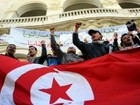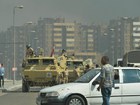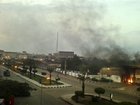With chaos in Libya, military takeover in Egypt and Syria's brutal conflict threatening to extinguish hopes fueled by the Arab Spring, only Tunisia stands out even as its stability hangs in the balance.
By the end of 2013, the political forces that emerged from the tumultuous changes in the region nearly three years ago have yet to build the new democratic order or bring about the social transformations demanded by the millions who took to the streets.
 Full Story
Full Story
A car bomb exploded near an Egyptian police building on Thursday in the Suez Canal city of Ismailiya, killing one policeman and wounding 35 other people, security officials said.
The bombing was followed by gunshots, the officials said, as witnesses said the noise of the blast was huge and that several ambulances rushed to the scene.
 Full Story
Full Story
A cousin and former aide of slain Libyan leader Moammar Gadhafi has been released two days after his acquittal in a trial for attempted murder, a security official said Wednesday.
Ahmed Qaddaf al-Dam, whose extradition Tripoli is demanding, was "freed overnight by police in Cairo following the court decision to acquit him" on Monday, the official said.
 Full Story
Full Story
Egypt said Tuesday it has granted three-month residence permits to 171 out of a total of 206 Syrian and Palestinian immigrants who were detained for illegally entering the country.
Foreign ministry spokesman Badr Abdelatty said the Syrians and Palestinians had entered Egyptian waters "under the pretense of being tourists, with the intention of passing through Egypt and illegally immigrating to other countries."
 Full Story
Full Story
Thirteen Egyptian and international human rights organizations on Tuesday urged Cairo's military-installed authorities to probe the mass killing of Islamist protesters in the capital on August 14.
The joint call issued by organizations that included Amnesty International, Human Rights Watch and Egyptian Initiative for Personal Rights, said an investigation must be launched into the killing of "up to 1,000 people by security forces" almost four months ago when they dispersed sit-ins by supporters of deposed president Mohammed Morsi.
 Full Story
Full Story
Egyptian troops killed on Monday a leader of an al-Qaida inspired militant group that operates in the Sinai peninsula and that has claimed attacks against security forces, the army said.
Ibrahim Mohammed Salaima, also known as Abu Sohaib, a "field leader" from Ansar Beit al-Maqdis group, was killed in North Sinai, army spokesman Ahmad Ali said in a statement.
 Full Story
Full Story
Police fired tear gas Monday in clashes with Islamist students of Cairo's al-Azhar University who hurled stones and torched vehicles during a demonstration backing ousted president Mohammed Morsi, officials said.
Violence in and around the university's dormitory erupted when a few hundred students began protesting and poured onto nearby streets, security officials said.
 Full Story
Full Story
Egypt's Muslim Brotherhood chief Mohammed Badie Monday attended the first session of his second trial, his lawyer said, marking his first public appearance since he was arrested in August.
Badie, the Brotherhood's Supreme Guide, appeared alongside 14 other members of the Islamist movement to face charges of inciting violence in the Cairo neighborhood of Bahr al-Aazam that led to deadly clashes in July, lawyer Mohammed Damaty said.
 Full Story
Full Story
Three prominent Egyptian secular activists went on trial on Sunday charged with participating in a violent protest, following a restrictive new law that has sparked international criticism.
The trial of Ahmed Maher, Ahmed Douma and Mohammed Adel is the first of secular activists since Islamist president Mohammed Morsi was deposed by the army in July. Adel is being tried in absentia.
 Full Story
Full Story
An Egyptian court was to try 21 Islamist university students Sunday, including a Turkish man, after a violent protest outside the prestigious al-Azhar religious institution, prosecution officials said.
The students at al-Azhar University in Cairo are accused of attacking the headquarters of the Sunni Muslim authority in a November protest.
 Full Story
Full Story



